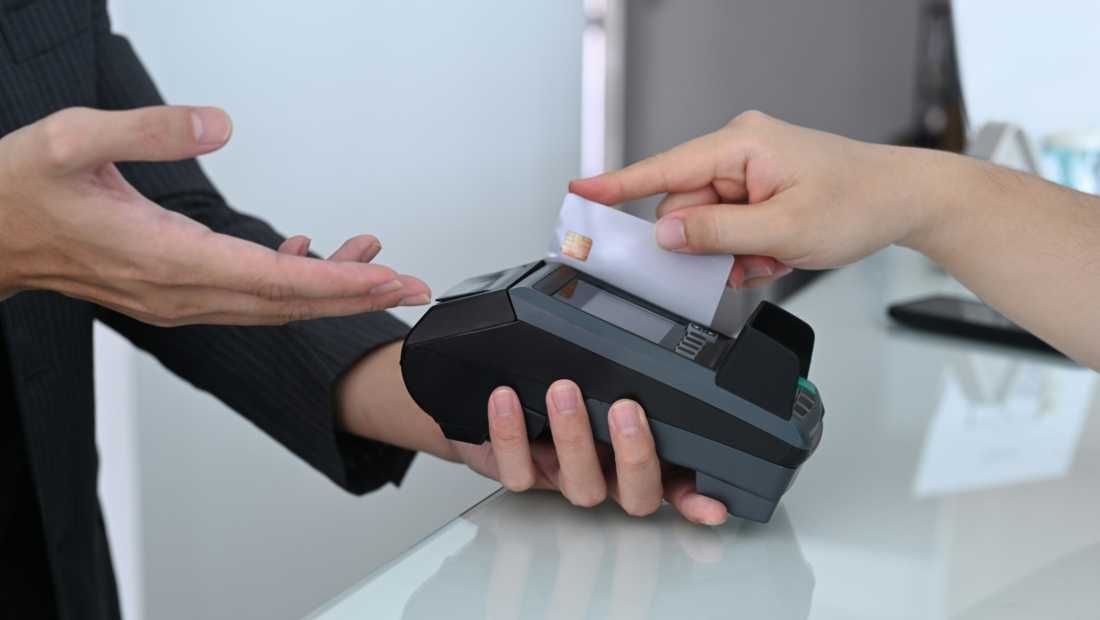Declined for a Credit Card: What to Do Next

Build strong credit
while you save

Getting declined for a credit card can be frustrating, but it’s only a temporary setback. There is a way to appeal the decision, and you can always strengthen your application and try again in a few months.
If a credit card issuer recently denied your application, here’s what you need to know to move forward, including the most common reasons for rejection and the steps you can take to prevent it from happening again.
Reasons for Being Declined for a Credit Card
There are many potential reasons for a declined credit card application. Here are some of the most common causes to help you figure out what happened to you and how to resolve the issue.
Negative Payment History
Payment history is worth 35% of your FICO score, making it the most significant factor affecting your credit. All your monthly debt payments must be on time to maximize your score. The longer your track record of doing so, the better.
If your credit report shows that you’ve missed one or more credit card debt payments in the past, a company may decide not to offer you an account. Unfortunately, a late payment stays on your credit report for seven years.
That said, they become less impactful over time. If you only missed one credit card payment a few years ago, it’s likely that something else contributed to your application denial.
Too Much Outstanding Debt
How much debt you owe is worth 30% of your FICO score. That makes it the second most significant credit scoring factor after your payment history and almost as impactful.
If a credit card company believes you’re near the maximum amount of debt you can afford, they won’t give you any more for fear that you’ll fail to pay them back.
One way creditors gauge whether you’re near that threshold is via your credit utilization ratio. It equals your outstanding balances divided by your credit limit. For example, your utilization is 25% if you owe $1,000 on a card with $4,000 total available credit.
While there’s no official maximum that creditors will tolerate, lower ratios are better. General wisdom says you’re safe as long as you’re below 30%, but somewhere between 1% and 10% is best for your credit score.
Too Many Recent Applications
Every time you apply for a new credit account, your prospective creditor checks your credit and adds a hard inquiry to your credit report. Each of these lowers your FICO score, and too many in quick succession is a red flag to lenders.
For example, if you’ve applied for half a dozen credit cards in the last two months, creditors will probably suspect that you’re in financial distress and decide not to offer you an account.
Alternatively, you could run into anti-churning restrictions that stop consumers from opening accounts for the sign-up bonuses. For example, Chase will decline your credit card application if you’ve opened five cards in the last 24 months.
Recent Credit Mistakes
Credit card companies emphasize recent events more than older ones. Your latest behavior is their best predictor of your future actions.
As a result, making mistakes that harm your credit right before you apply for a new card can cause them to reject your application, even if they’re relatively minor.
For example, you’ll likely struggle to qualify for a credit card if you missed a debt payment a few weeks before applying.
Insufficient Income
In addition to checking your credit score and reviewing your credit report, credit card issuers will consider your income before lending to you. They’re legally required to check that you earn enough money to repay your debts.
As a result, creditors always ask for your annual income and its source, and they may ask for proof. For example, if traditional employment is your primary source of income, they could request your last few pay stubs.
Unstable Work History
Not only do card issuers want confirmation that you earn an income high enough to pay your debts, but they also want to know you’ll maintain access to it. If they suspect your earnings aren’t stable, you might not qualify for a credit card.
For example, a card issuing bank may require that you maintain your current employment for at least six months. If you just entered the workforce or bounced between jobs too rapidly, they could reject your application.

Thin Credit File
If you’re applying for your first credit card, a thin credit file is a common reason for rejection. When your credit history is limited, it can cause you to have a low credit score or prevent you from generating one altogether.
Lenders usually want to see that you have a history of handling credit responsibly before they’ll offer you an account. As a result, most will reject your application if they find out you’ve never managed any debt before.
While that seems like a catch-22, there are many ways to get your first credit account. After all, everyone has to start somewhere. For example, you could apply for a secured credit card or get a cosigner to guarantee your debts.
Additional Age Restrictions
If you’re under the age of 21, you’ll have more difficulty qualifying for a credit card than someone who is older. The Credit Card Accountability, Responsibility, and Disclosure Act of 2009 (CARD) imposes additional restrictions on offering cards to younger people.
First, you can’t qualify for any credit card while under the age of 18. You can only access a credit line as a minor if someone adds you to an account as an authorized user.
If you’re 18 to 20 years old, you need proof of independent income or a qualified cosigner to get a credit card. Meanwhile, someone older than 21 can list any income they can reasonably expect to access.
For example, someone aged 25 could qualify for a credit card by listing their significant other’s income, even though they don’t necessarily have any legal right to access it, but someone aged 19 couldn’t.
What Happens After You’re Denied a Credit Card?
When you’re denied a credit card, the provider is required to send you an adverse action notice. That might sound intimidating, but it’s just a letter explaining their reasons for rejecting your application. You should expect it within a couple of weeks.
Otherwise, not much else happens when a card issuer denies your request for an account. Your score won’t suffer any more than it would if you’d received approval.
However, that doesn’t mean you can apply for credit cards recklessly. Remember, you add a hard inquiry to your credit report whenever you request a new account, whether you get approved or denied. Each one can take around five points off your score.
How To Make Sure You’re Approved the Next Time
Getting denied for a credit card you wanted is disappointing, but try to think of it as an opportunity to improve. Here’s a step-by-step guide to help you learn from the rejection, develop your credit or finances, and get a more positive response next time you apply.
Review Your Adverse Action Notice
When a creditor denies your application for an account, you should receive an adverse action notice explaining their reasons for rejecting you within a couple of weeks, although they technically have 60 days to get it to you.
The notice provides insight into your shortcomings, which are your best opportunities for improvement. If the issue is your credit, they must also share the score and the credit bureau they used.
Your adverse action notice won’t go into too much detail, but it should tell you which aspect of your credit is holding you back the most. For example, it could be your payment history or amounts owed.
Review Your Credit Report
If your adverse action notice indicated that your credit was the problem, pull your reports from Equifax, Experian, and TransUnion. They can provide a more detailed picture of your credit that’s invaluable as you work to improve your application.
Use your reports to investigate the scoring factor your letter claimed was the most problematic. For example, if it says your outstanding debt balances were too high, your credit report can show you which accounts are causing the most problems.
Fortunately, you can get a copy of all three major credit reports for free each year from AnnualCreditReport.com.
Dispute Any Errors
Unfortunately, the credit bureaus who compile your information into credit reports are far from infallible. In fact, they make mistakes that can negatively impact your ability to qualify for credit surprisingly often.
One recent study by Consumer Reports showed that 34% of participants found at least one error in their credit reports. As a result, it’s well worth going through each of yours to confirm their accuracy.
If you find any information that you believe is incorrect, you can dispute it with the credit bureaus. Fortunately, Experian, Equifax, and TransUnion all let you initiate the process through their online portals.
Improve Your Credit Score
If your credit was the reason you didn’t qualify for your desired card, spend at least a few months building it before you try again. Typically, your payment history and amounts owed are the best areas to focus on improving.
Fortunately, your payment history has never been easier to build. Even if you can’t qualify for a credit card, you can take out a credit-builder loan like CreditStrong’s to help.
We keep your loan proceeds in a locked savings account during the life of the loan, so there’s no credit check to apply, and you can qualify even with a bad credit score. And unlike a secure credit card, you don’t need to provide the collateral.
If your outstanding debt levels are holding you back, focus on paying them down as aggressively as possible. Tighten your budget and devote every spare dollar to chipping your balances away.
Bolster Your Income
If your adverse action notice indicates that insufficient funds were the primary reason for your application rejection, increase your earning power before applying again.
Negotiating a raise at work might be difficult, but picking up an easy side hustle can also improve your chances. Creditors are willing to consider self-employment income in addition to your W-2 wages.
If you have other income sources, such as interest income from a savings account or a college scholarship, make sure to include those on your application too.
Get a Qualified Cosigner
One of the easiest ways to improve the strength of your credit application is to get a qualified cosigner to guarantee your debts. If you default, they’re responsible for paying your balances, which makes you a much safer lending prospect.
As a result, it’ll be much easier to qualify for most credit accounts. Just make sure you get a cosigner with a good credit score and a healthy income, or they won’t be able to add as much value to your application.
Consider More Accessible Credit Cards
Credit card issuers create their products with specific target customers in mind. For example, each one’s best credit card and rewards program is going to be for people with excellent credit scores.
If you apply for one of these accounts too early, your chances of qualifying will be low. Instead, go after accounts created for consumers with your credit rating.
Once you’ve bolstered your application strength as much as possible, take an honest look at your credit and see if you can realistically qualify for the account you applied for previously.
If you’re still not confident that you can get the card, consider targeting one that’s more accessible, such as a student credit card or a secured card.
FAQs
How Do I Ask for a Reconsideration?
You can ask for a reconsideration of your credit card denial by calling the credit card issuer’s customer service or sending them a letter. It’s best to do this within a few days of the decision to avoid it counting as a new application.
To be successful, you generally need to provide new information that addresses the reason for your rejection. For example, if your income was deemed too low, you might get a provider to reconsider by showing them that you just got a raise at work.
Does Getting Declined for a Credit Card Hurt Your Score?
Fortunately, getting declined for a credit card doesn’t hurt your score. At least, it doesn’t do any more damage than you would experience if you had received a positive response from your prospective card issuer.
Whenever you apply for a new credit card or loan, the creditor checks your credit score and adds a hard inquiry to your credit report. Each of these costs you a few points, but your score should recover in a year.
How Long Do I Have To Wait To Apply for a Credit Card After Being Denied?
Technically, getting a declined card application doesn’t prevent you from reapplying immediately. However, it’s usually best to wait around six months before trying again.
Not only does that give you enough time to work on the aspects of your application that need improvement, but it also lets your score recover from the hard inquiry and shows lenders that you’re not desperate for credit.
How Much Income Do You Need for a Credit Card?
There’s no universal income necessary for a credit card account. Minimums can vary between cards. For example, secured credit cards may have lower income requirements than high-tier travel rewards cards.
Unfortunately, credit card companies don’t generally publish their requirements, so there’s no way to know how much income you need to qualify.
However, gross income shouldn’t limit you significantly if you have a full-time job and a reasonable salary. Lenders can adjust your credit limit to match your earning power.
CreditStrong helps improve your credit and can positively impact the factors that determine 90% of your FICO score.
